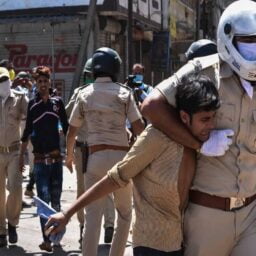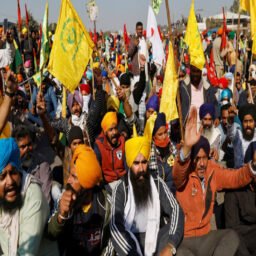INTRODUCTION
The Year 2020 started with what was probably the largest and most severe pandemics the human race has faced in the 21st Century. Millions of people lost their lives after contracting the virus and several more are still suffering from the secondary infections caused due to complications. The Era of the Covid-19 has not only challenged us physically but also economically. The past year was riddled with bouts of lockdowns that lasted months and this was detrimental to economies across the globe. India being a developing nation and the second-most populous country in the world, bore the brunt of the virus. Many businesses were forced to shut down and many people lost their livelihood. Covid-19 in India can also be categorised by the migrant labour crisis that riddled states across the country. Migrant labourers took on a mass exodus to their hometowns as all shops and businesses were under lock and key. The Labour force in India suffered a huge blow and this, in turn, affected the unorganised sector. Now, in 2021, the situation is still grim but the government has decided that shutting down all economic activity would only lead India down a trench from which there is no return. Many states like Uttar Pradesh, Madhya Pradesh and Karnataka have issued ordinances that relax certain provisions of the existing labour laws that allow businesses to extract more work from their labourers as a desperate attempt to bring back the pre-existing levels of production. But is overworking the labourers in the name of economic survival justified?
THE REASONS FOR THE DILUTION OF LABOUR LAWS
The Working Class remains the worst affected section of society from the economic effects of Covid-19. Many Labourers migrated to their hometowns as they lost their sources of income due to layoffs. After the lockdown restrictions were eased and economic activity resumed, these labourers migrated back to the cities where they were employed in a desperate attempt to earn income. The States used this as an opportunity to cope up with the severe economic and logistic distress they were facing and used the ordinance making powers of the governor mentioned under Article 213 of the Constitution of India to relax and modify certain provisions of the existing labour codes. The modifications included an extension of the working hours, an increase in the number of workers allowed in the factory and also provisions for overtime wages. These measures were taken to reduce the economic impact of Covid-19 induced lockdowns and also to increase production.
CONSTITUTIONALITY OF THE DILUTION OF LABOUR LAWS
The Dilution of labour laws was done with the intention of promoting economic growth within states but these modifications overlooked and trampled upon several welfare measures that the labour force was entitled to. This circumvention of welfare measures for economic growth directly encroaches upon certain fundamental rights that the labourers are entitled to. These modifications directly violate Article 21 of the Constitution which is the fundamental right to life and personal liberty and Article 23 of the Constitution which prohibits forced labour. These modifications were made at the cost of several social security and welfare measures that benefitted and improved the working conditions of the labourers. The landmark case of Maneka Gandhi v. Union of India[1]extended the scope of Article 21 and included the “right to live with dignity” in its ambit. This right to live with dignity meant that a person possesses the right to good health, nutrition and also a hospitable work environment. Therefore, it can be ascertained that the dilution of the welfare provisions under the labour codes directly violates Articles 21 and 23 of the constitution. When we closely analyse the precedent in the landmark case of Sunil Batra V. Delhi Administration[2], the court held that the right to health is an integral part of Right to Life under Article 21 of the Constitution and the modification of labour laws increases the working hours of the labours without any provision for overtime pay, it also increases the threshold for the number of people who can work in a factory or another production establishment.
IMPORTANT JUDICIAL PRONOUNCEMENTS
Certain important judicial pronouncements pertain to the Labour Law regime and these judicial pronouncements were made keeping the welfare and wellbeing of the labour force in India. In the case of Bandhua Mukti Morcha V. Union of India[3], A Public interest litigation was filed under Article 32 of the Constitution to take steps to end bonded labour and child labour in the country. There is a right against bonded and forced labour under Article 23 of the Constitution and this case also called for just and reasonable remuneration of the labourers. In Randhir Singh V. Union of India[4], The court upheld the principle of equal pay for equal work and stated that it is not an abstract principle but one of substance and importance.
RESTRICTIONS ON LABOUR UNIONS
The dilution in many states also imposed certain restrictions on the rights and functions of trade unions. This restriction is detrimental to the wellbeing of the labourers as the labour unions are the only forums that actively fight for the interests and welfare of the labourers in the country. The labour unions also partake in dispute resolution and act as a medium of communication between the labourers and the employers because a majority of the labourers are unaware of their rights and therefore easily get exploited by their employers. These restrictions would greatly hinder the ability of the labour unions to work for the welfare of the labourers.
CONCLUSION
The Dilution of labour laws was done for a good cause, however, several questions can be raised about its implementation. These measures were taken hastily and not enough deliberation was done before the implementation of these modifications. The labourers now stand defenceless in the hands of their employers who can extract every ounce of work without paying any attention to their welfare and health. The governments of the respective states must reconsider the suspension of social security and welfare provisions as it would only lead to the degradation of the quality and productivity of labour in the long run.
Author(s) Name: P Mir Minhaaj Ahmed (Student, CHRIST University, Bengaluru)
References:
[1] Maneka Gandhi V. Union of India AIR 1978 SC 597
[2] Sunil Batra V. Delhi Administration 1980 AIR 1579
[3] Bandhua Mukhti Morcha v Union Of India AIR 1984 SCC 802
[4] Randhir Singh V. Union of India 1982 SCR 3 298
















